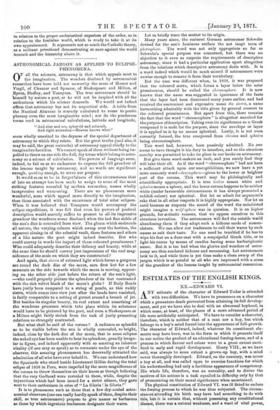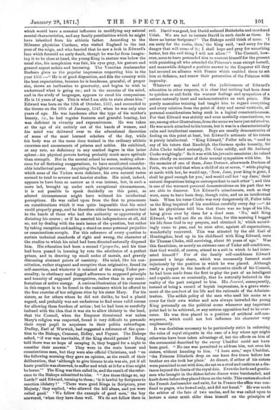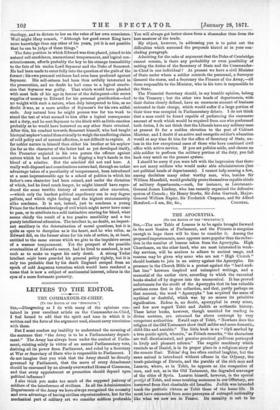ESTIMATES OF THE ENGLISH KINGS.
XX.—ED WARD VI.
ANY estimate of the character of Edward Tudor is attended with two difficulties. We have to pronounce on a character which a premature death prevented from attaining its full develop- ment, and yet we have also to deal with an abnormal boyhood, in which some, at least, of the phases of a more advanced period of life were artificially anticipated. We have to consider a character, therefore, which is neither that of a man nor a boy, but which belongs to a boy's mind forced into the appearance of fall-growth. The character of Edward, indeed, whatever its constituent ele- ments may have been, was in the form in which it presents itself to our notice the product of an educational forcing-house, and of a process in which flavour and colour were to a great extent sacri- ficed to early and rapid development. Henry VIII., as we have said, was always to some extent a grown-up boy, with a mind never thoroughly developed. Edward, on the contrary, was never a boy at all, and was called uppn to exercise functions for which his understanding had only a factitious appearance of competency. His whole life, therefore, was an unreality, and to divine the motives of his actions is a task equalled in difficulty only by that of pronouncing on their moral significance when ascertained.
The physical constitution of Edward VI. was ill fitted to endure the forcing process to which he was thus subjected. The circum- stances attending his birth may have had something to do with this, but it is certain that, without possessing any constitutional disease, there was a natural weakness, and a want of vital power, which would have a material influence in modifying any natural mental characteristics, and any family peculiarities which he might have inherited from his athletic father. According to the Milanese physician Cardano, who visited England in the last year of the reign, and who fancied that he saw a look in Edward's face which foretold an early death, though he was far from imagin- ing it to be close at hand, the young King in stature was below the usual size, his complexion was fair, his eyes grey, his gesture and general aspect sedate and becoming. The Venetian Ambassador Barbaro gives us the popular impression respecting him in the year 1531 :—" He is of good disposition, and fills the country with the best expectations, because he is handsome, graceful, of proper size, shows. an inclination to generosity, and begins to wish to understand what is going on ; and in the exercise of the mind, and in the study of languages, appears to excel his companions. He is 14 years of age. This is what lain able to state about him." Edward was born on the 12th of October, 1537, and succeeded to the throne on the 28th of January, 1547, when he was only nine years of age. He was handsome after the type of his mother's beauty, i.e., he had regular features and graceful bearing, but was deficient in vivacity and expressiveness. He was taken at the age of six entirely out of the hands of women, and his mind was delivered over to the educational discretion of some of the most learned scholars of the day, while this body was at the same time trained in the ordinary athletic exercises and amusements of princes and nobles. He exhibited, at any rate, no deficiency in any marked degree in this latter sphere—his physical powers having probably much more aptitude than strength. But in the mental school he seems, making allow- ance for all flattering exaggerations, to have manifested consider- able intellectual power. Acquiring the lighter accomplishments, in which none of the Tudors were deficient, his own natural tastes seemed to tend to severer and heavier studies. His mind, indeed, appears to have been as narrow as it was intense, but, in such a mere lad, brought up under such exceptional circumstances, it is not possible to speak decidedly on this point, as altered Circumstances might have widened his intellectual perceptions. He was called upon from the first to pronounce .on considerations which it was quite impossible that his mind -could properly grasp, and he therefore either became a passive tool in the hands of those who had the authority or opportunity of dictating his course ; or if he asserted his independence at all, did so, not by dealing with the main issues of the question, but rather by taking exception and making a stand on some personal prejudice or conscientious scruple. For this reference of every question to certain technical standards of right and wrong, the character of the studies to which his mind had been directed naturally disposed him. His education had been a second Cyropmdia, and his time tad been passed in learning by rote the attributes of a perfect prince, and in drawing up small codes of morals, and gravely discussing abstract points of casuistry. His mind, like his con- stitution, rather stagnant and receptive than originative, found its self-assertion, and whatever it retained of the strong Tudor per- sonality, in obstinacy and dogged adherence to supposed principle and tenacity of supposed prerogatives, rather than in any mani- festations of active energy. A curious illustration of his character in this respect is to be found in the resistance which he offered to the free exercise of her religious rites by his sister Mary. For his sisters, as for others whom he did not dislike, he had a placid regard, and probably was not undesirous to find some valid excuse for allowing them freedom of action ; but he had been so carefully imbued with the idea that it was sin to allow idolatry in the land, that the Council, when the Emperor threatened war unless Mary's religion was respected, found it very difficult to persuade their royal pupil to acquiesce in their politic subterfuges. Dudley, Earl of Warwick, had suggested a reference of the ques- tion to the Bishops, Cranmer, Ridley, and Poynet. The Bishops asked, "if war was inevitable, if the King should persist? Being told there was no hope of escaping it, they begged for a night to consider their answer." They were in the main honest and -conscientious men, but they were also official Christians, and "on the following morning they gave an opinion, as the result of their deliberation, that 'although to give licence to sin was sin, yet if all haste possible was observed, to suffer and wink at it for a time might be borne." The King was then called in, and the result of the refer- ence to the Bishops submitted to him. "'Are these things so, my Lords?' said Edward, turning to them ; is it lawful by Scripture to sanction idolatry ? " There were good Kings in Scripture, your Majesty,' they replied, 'who allowed the hill altars, and yet were called good.' 'We follow the example of good men,' the boy answered, 'when they have done well. We do not follow them in
evil. David was good, but David seduced Bathsheba and murdered Uriah. We are not to imitate David in such deeds as these. Is there no better Scripture?' The Bishops could think of none. 'I am sorry for the realm, then,' the King said, and sorry for the danger that will come of it ; I shall hope and pray for something better, but the evil thing I will not allow.'" The Council, how- ever, seem to have persuaded him to content himself for the present with punishing all who attended the Princess's mass except herself, and meanwhile delayed a positive answer to the Emperor till they had secured an alliance with France which enabled them to set him at defiance, and renew their persecution of the Princess with impunity.
Whatever may be said of the judiciousness of Edward's education in other respects, it is clear that nothing had been done to quicken or call forth the warmer feelings and sympathies of a nature naturally inert and undemonstrative on such points. His purely masculine training had taught him to regard everything and every relation from the point of duty and moral rectitude, all personal considerations being sunk in a logical conscientiousness. For that Edward was strictly and even morbidly conscientious, we see, among other illustrations, from the scene we have just referred to. He was much attached to his tutors, but it was in a characteristically calm and intellectual manner. Boys are usually demonstrative of feeling on this point at least, but Edward's estimate of his tutors is purely intellectual. "King Edward," Fuller tells us, "used to say of his tutors that Randolph the German spoke honestly, Sir John Cheke talked seriously, Dr. Coxe solidly, and Sir Anthony Cooke weighingly." So it was with his juvenile associates ; he valued them chiefly on account of their mental sympathies with him. In the memoirs of one of them, Jane Dormer, afterwards Duchess of Feria, we are told that when a child of six or seven, "while playing at cards with her, he would say, 'Now, Jane, your king is gone, I shall be good enough for you,' and would call her 'my Jane,' their natural dispositions being so correspondent to each other "; and this is one of the warmest personal demonstrations on his part that we are able to discover. Yet Edward's attachments, such as they were, seem to have been deep, though calm, and on an intellectual basis. When his tutor Cheke was very dangerously ill, Fuller tells us the King inquired of his condition carefully every day :—" At last his physicians told him that there was no hope of his life, being given over by them for a dead man. No,' said King Edward, 'he will not die on this time, for this morning I begged his life from God in my prayers, and obtained it,' which accord- ingly came to pass, and he soon after, against all expectations, wonderfully recovered. This was attested by the old Earl of Huntingdon, bred up in his childhood with King Edward, unto Sir Thomas Cheke, still surviving, about 80 years of age." Was this fanaticism, or merely an extreme case of Tudor self-confidence, that God would, of course, attend to a suit in which he had inter- ested himself ? For of the family self-confidence Edward possessed a large share, which was necessarily fostered most injuriously by the position in which he was placed. Although really a puppet in the hands of successive chiefs of his Council, he had been made from the first to play the part of an intelligent and capable man so constantly, that he naturally believed in the reality of the part assigned to him. His Journal, consequently, instead of being a record of boyish impressions, is a grave state- ment of the conduct of his life and the rationale of the Adminis- tration. The selfish policy of the men who used his name as a cover for their own wishes and acts always intruded the young King personally on the political scene whenever any important point had to be achieved, or any serious opposition had to be over- come. He was thus placed in a position of artificial self-con- sequence, which could not but influence his character very unpleasantly.
It was doubtless necessary to be particularly strict in enforcing the rules of royal etiquette in the case of a boy whose age might otherwise have been taken advantage of, but the effects on him of the ceremonial described by the envoy Ubaldini could not have been good. "No one was permitted to address him, not even his sisters, without kneeling to him. 'I have seen,' says Ubaldini, the Princess Elizabeth drop on one knee five times before her brother ere she took her place.' At dinner, if either of his sisters were permitted to eat with him, she sat on a stool and cushion at a dis- tance beyond the limits of the royal dais. Even the lords and gentle- men who brought in the dishes before dinner were bareheaded, and knelt down before theyplaced them on the table. This custom shocked the French Ambassador and mite, for in France the office was con- fined to pages, who bowed only, and did not kneel." He was made the arbiter of the fate of two uncles, and he was called upon to lecture a sister much older than himself on the principles of
theology, and to dictate to her on the rules of her own conscience. Well might Mary remark, "Although her good sweet King have more knowledge than any other of his years, yet it is not possible that he can be judge of these things."
The false position in which Edward was thus placed, joined to his natural self-confidence, unemotional temperament, and logical con- scientiousness, affords probably the key to his strange insensibility to the fate of his uncles Lord Seymour and the Duke of Somerset. He had been made to enter fully into the question of the guilt of the former ; his own personal evidence had even been produced against Seymour. His self-esteem had been thus artfully interested in the prosecution, and no doubt he had come to a logical conclu- sion that Seymour was guilty. That which would have pleaded with most lads of his age in favour of the delinquent—his secret supplies of money to Edward for his personal gratification—had no weight with such a nature, when duly interpreted to him, as no doubt it was, as a mere artifice of Seymour's for his own selfish ends. Any natural love he might possess was far too weak to stand the test of what seemed to him alike a logical consequence and a duty, and he sent Seymour to the block with as little emotion probably as he would have bestowed on any other State criminal. After this, his conduct towards Somerset himself, who had taught his royal nephew's mind thus stoically to weigh the conflicting claims of cold policy and of natural affection, is not difficult to explain. A far nobler nature in himself than either his brother or his nephew (as far as the character of the latter had as yet developed itself), the Protector expiated in his own person the offence against nature which he had committed in dipping a boy's hands in the blood of a relative. But the mischief did not end here. A really well-disposed and conscientious nature had, through an unfair advantage taken of a peculiarity of temperament, been introduced at a most impressionable age to a school of politics in which his father's own character had been ruined, and under the dictation of which, had he lived much longer, he might himself have repro- duced the same terrible history of execution after execution, —which only the hardest political expediency can in any degree palliate, and which right feeling and the highest statesmanship alike condemn. It is not, indeed, just to condemn a young Prince for the foreshadowings of evil which might never have come• to pass, or to attribute to a cold instinctive craving for blood, what seems chiefly the result of a too passive sensibility and a too purely intellectual education. The intellect is, no doubt, an import- ant auxiliary in the determination of moral questions, but it is quite as open to deception as is the heart, and he who relies, as Edward did, on the former alone for his rule of action, is, at least, entitled to the same excuse which we give to the impulsive errors of a warmer temperament. Yet the prospect of the possible eventualities of Edward's career, had he lived to manhood, is not such as to make us regret his early death. A strong Tudor intellect might have guarded his general policy rightly, but it is only too probable that by his death England escaped from an epoch of cold Augustan terrorism which would have rendered a name that is now a subject of sentimental interest, odious in the eyes of a more fortunate posterity.




































 Previous page
Previous page